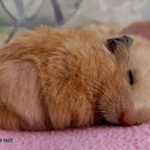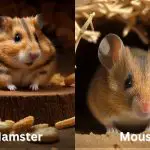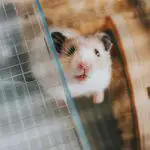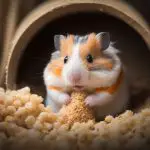Why Do Hamsters Eat Their Poop? A Disgusting But Beneficial Habit!
Poop eating or coprophagy is quite common in hamsters and other rodents. But have you ever wondered why hamsters eat their own poop? It may seem strange and distasteful, but this behavior is normal and beneficial for your pet.
So why do hamsters eat their poop? Hamsters eat their feces to obtain additional nutrients and re-digest food. This is normal behavior for hamsters and does not usually indicate a health problem.
This post explores the science behind hamsters eating their poop. We’ll also explore the health benefits associated with this behavior.
Why Do Hamsters Eat Their Poop?
Hamsters practice coprophagy in two ways: directly eating their own feces or indirectly eating fecal matter mixed with other food particles. And there are a few reasons hamsters may engage in this behavior,
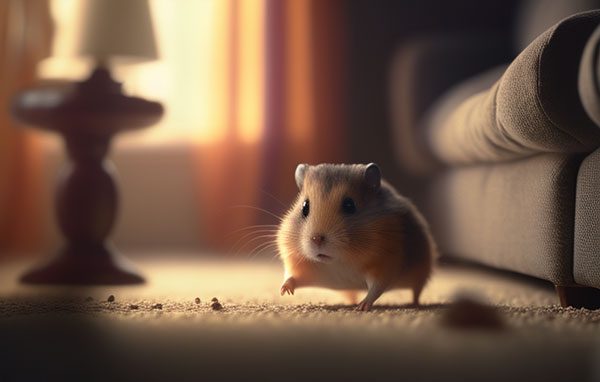
1. Maximize Nutrient Extraction
The evolutionary advantage of coprophagy is that it allows the hamster to extract more nutrients from its food by re-ingesting its own feces. In addition, feces are a great source of protein and fat, which are necessary for proper growth and development.
2. Maintain Immune System & Gut Microbiota
Coprophagy also helps the hamster maintain their immune system. The bacteria present in its digestive system help the body recognize and fight off potential illnesses and infections.
A research paper in the ISME journal uncovered that the ingestion of feces by herbivores is beneficial in maintaining a rich gut microbiota. Ultimately, it leads to various health advantages like a balanced energy level and improved cognitive performance.
3. Natural Hygienic Behavior
Lastly, coprophagy helps keep a clean environment for the hamster by eliminating excess waste from their living space. Hamsters are very clean animals and like keeping their living space clean.
By eating their feces, they remove waste from their living area, which helps maintain a clean and hygienic environment.
The Nutritional Benefits of Coprophagy Explained
Eating their excrement is a helpful tactic for hamsters. That’s how they maximize their nutrient intake without consuming excessive quantities of the fresh food that we provide.
To supplement their intake of essential vitamins and minerals, notably Vitamin B12, hamsters must partake in this crucial activity.

The hamster’s small intestine can only synthesize the B12 vitamin, yet it must be ingested in the stomach for absorption into the body. This implies that the hamster has to eat its feces to transport the nutrient back to the stomach.
Like all living beings, Hamsters need vitamin B12 for various cellular functions. These include the production of red blood cells, maintaining a healthy nervous system, and synthesizing DNA.
Hamster Poop Types: Which Is More Beneficial?
Not every hamster poop is beneficial. Hamsters produce two types of feces: the hard, dry feces found in their cage, and the soft feces produced mostly during the night.
When your hamster is indulging in the practice of coprophagy, it’s consuming its night droppings. Night excrements contain a wealth of vitamin B12, and it’s the only way hamsters can receive this nutrient.
Hamster poop is generally not foul-smelling. Hamsters are clean animals, and their droppings are dry and odorless. However, if there is an issue with their diet or living environment, it may lead to a smell.
It’s important to keep their cage clean and provide them with a balanced diet to prevent any issues with their waste.
Can Diet Change Stop Hamsters From Eating Poop?
No. Diet change cannot stop hamsters from eating poop. It is actually normal and natural behavior for hamsters.

The behavior is believed to serve several purposes. And that includes helping the hamster re-digest food and extract additional nutrients. It can also aid the formation of hard feces that can be used to mark territory.
Diet Change Doesn’t Work
Many pet owners attempt to change their hamster’s diet to stop them from eating their feces. Unfortunately, diet changes are unlikely to have any effect on this behavior.
Hamsters are hardwired to engage in coprophagy, and even a complete change in diet will not necessarily stop them from eating their feces. It is also important to note that coprophagy is not necessarily harmful to hamsters.
And it may not be pleasant for pet owners to witness. But as long as the hamster is healthy and not exhibiting any other concerning behaviors, there is no need for concern.
In fact, trying to intervene or prevent coprophagy can cause more harm than good, as it can stress the hamster and disrupt its normal digestive process.
Focus On Providing a Balanced Diet & Clean Environment
Instead of changing their diet to stop coprophagy, pet owners should focus on providing their hamsters with a healthy and balanced diet. Also, provide with a clean and spacious living environment.
This will help to ensure that their hamster remains healthy and happy. It will also reduce the amount of feces produced, making coprophagy less noticeable.
Are There Any Risks Associated With Coprophagy?
Yes. There are risks associated with coprophagy (ingesting feces) in hamsters. First, coprophagy can lead to the transmission of parasites and diseases.
Hamsters can carry various parasites in their digestive tract, and by eating their own feces, they are re-ingesting the parasites, increasing the risk of infection.

Additionally, if a hamster eats the feces of another hamster, it can result in the transmission of parasites and diseases.
Hamsters can carry bacterial and viral infections, such as Salmonella, which can be transmitted through their feces.
Hamsters are fascinating creatures with unique behaviors that can sometimes be confusing to their owners. If you’re wondering why hamsters eat their babies or how long they can be left alone, we have the answers for you. Our article on why hamsters eat their babies explores the possible causes of this behavior and what you can do about it. Meanwhile, our article on how long hamsters can be left alone provides valuable information about the maximum time your pet can stay alone without any harm. By reading these articles, you’ll be better equipped to provide your hamster with the care it needs. So, go ahead and check them out!FAQs
We’ll examine and answer some frequently asked questions about this behavior.
Q: How often do hamsters eat poop?
Regarding frequency, it is difficult to say how often hamsters eat their own poop as it can vary from individual to individual. Some hamsters may engage in this behavior daily, while others may do it less frequently.
Additionally, the frequency of coprophagia can depend on the individual hamster’s diet and nutritional status.
Q: What does a hamster poop look like?
Hamster poop is small, dark, and cylindrical in shape. It is similar in appearance to mouse droppings but slightly larger. Hamster droppings are usually about 2mm-5mm long and are usually found in clusters or piles.
Q: Is hamster poop dangerous to humans?
Despite the lack of an unpleasant smell, hamster poop should not be overlooked as it can pose serious risks. For example, it may contain the Salmonella bacteria, which, when ingested by humans, can lead to Salmonellosis.
Additionally, they may contain the lymphocytic choriomeningitis virus, transmittable through contact with their excretions.
Conclusion
Poop eating is not harmful to hamsters and is normal for these rodents. It’s only a health risk if it re-ingests poop with harmful parasites or bacteria.
As long as your pet is healthy and showing normal behavior, there is no need to be concerned about coprophagy. However, if you notice any changes in your hamster’s behavior or health, it’s always a good idea to consult a veterinarian to rule out any underlying health problems.

